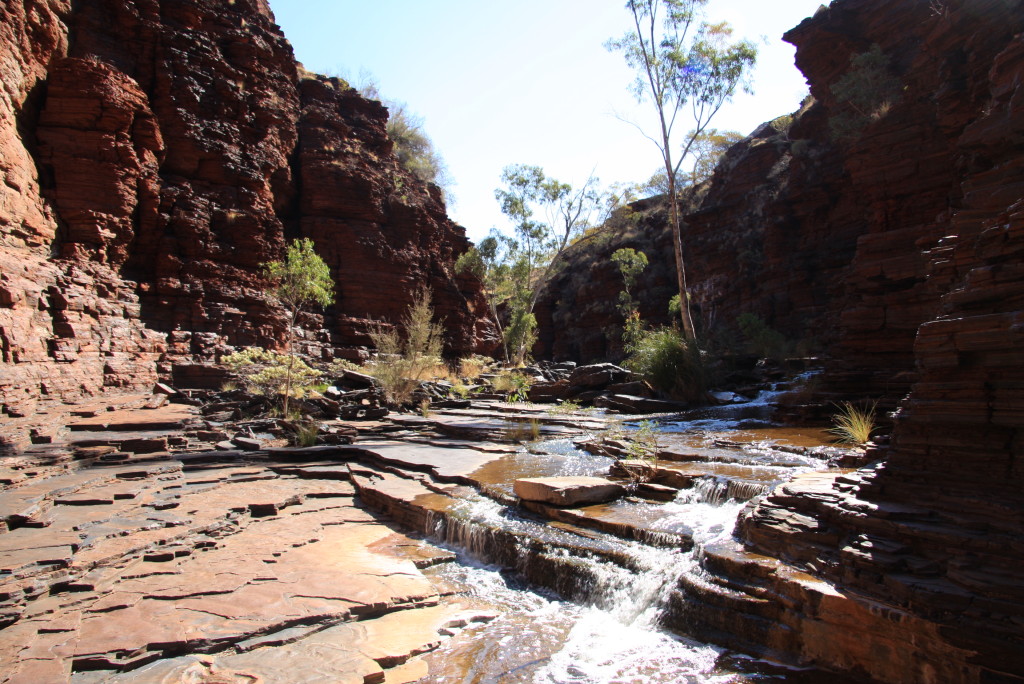

Karijini National Park is located in the Pilbara region, a five hour drive away from Karratha. Here you’ll discover an outback playground of rugged ranges, deep gorges, stunning waterfalls and clear plunge pools. The park offers different types of accommodation and can be visited all year round, but is most interesting in autumn or early winter. The Department of Parks and Wildlife produces a very informative brochure about the Karijini National Park which can be obtained along with other useful information from their website at http://parks.dpaw.wa.gov.au/.
History
Covering an area of approximately 628,000 hectares, Karijini is the second largest national park in WA. Its landscape of deep gorges and rocky tunnels was formed over 2 billion years ago, when the atmosphere contained much less oxygen and the only forms of life were simple iron and silica rich bacteria and algae. Over many millions of years, these iron-rich deposits gradually turned into the tough well-bedded rock you find in the park today.
Formerly known as Hamersley National Park, its modern name originates from the traditional Aboriginal land owners. The Banyjima, Kurrama and Innawonga Aboriginal people have lived in Karijini National Park for over 20,000 years, and it is proven that the diversity of vegetation and animal species found in the park today are a result of their ancient land management practices.
European explorer F.T. Gregory explored the area in 1861 and named the Hamersley Range, a major feature of Karijini National Park, after his close friend Edward Hamersley.
Wildlife
A diverse array of Western Australian plant and animal species thrive in Karijini National Park. While exploring the area you may encounter red kangaroos and euros, rock-wallabies, echidnas, geckos, goannas, bats and a wide variety of birds. Wildflowers vary with the seasons, but you may see many plants bloom profusely after rainy periods.
When travelling through the park please also be mindful of snakes when hiking through its spectacular gorges and mountainous trails.
Places to See
| Mount Bruce | To experience spectacular views and a thrilling physical challenge, climb Mount Bruce, situated 36 kilometres west of Karijini Visitor Centre in Karijini National Park. Standing at 1,235 metres, it is Western Australia’s (WA) second tallest peak. |
| Dales Gorge | Dales Gorge is one of the most popular gorges in the park. Its sunken gardens, deep pools and permanently flowing waterfalls are just beautiful and make a visit to Karijini National Park unforgettable. |
| Fortescue Falls and Circular and Fern Pool | Hike down Dales Gorge to Fortescue Falls and take the two hour walk to Circular Pool. Fern Pool is just a short stroll away from the car park. |
| Joffre, Knox and Red Gorges | Head to Oxers Lookout for breathtaking views over all three gorges. It’s also worth checking out Joffre and Knox Lookout, or taking a trip deep down into the gorges to impressive waterfalls and clear water pools. |
| Hancock and Weano Gorge | Weano Gorge is possibly the best introduction to Karijini National Park. A short hike brings you to Handrail Pool, which is perhaps one of the best swimming spots in Western Australia (WA). Hancock Gorge is simply stunning, but best experienced with a local guide. You will find luxury accommodation nearby at Karijini Eco Retreat. |
| Kalamina Gorge | A walk along the bottom of Kalamina Gorge gives you the chance to take a closer look at the structure and beautiful shades of red and blue in the rocks. |
| Hamersley Gorge | Hamersley Gorge is located in the far western corner of Karijini National Park, 100 kilometres away from the visitor centre. Here you will find amazing coloured banded iron formations, still pools and rambling undergrowth. |
Toilets, showers and water are available near Karijini Visitor Centre. Information shelters, picnic tables, and gas barbecues are also provided in the campgrounds and day use areas (visitor and camping fees apply).
Karijini National Park accommodation includes various camping facilities at Savannah and Dales Camp Grounds, or safari tents at Karijini Eco Retreat.
Wheelchair Access
There is assisted wheelchair access to Junction Pool Lookout, the Weano Day Use area and Cicular Pool Lookout. Independent wheelchair access is available at the Karijini National Park Visitor Centre and the Dales Day Use Area.
Getting There
If you are travelling from Karratha you can travel through Millstream-Chichester National Park onto the Rio Tinto Rail Access Road (Dampier to Tom Price) to the Karijini National Park and Tom Price. Please note however, to travel along this road you require an access permit, which can be easily obtained from the Pannawonica Library, Karratha, Roebourne and Tom Price Visitor Centres. Apart from the first 90km this road is unsealed / gravel. If you are driving a hire vehicle it is recommended you check with your hire company as to whether or not this is allowed. Alternatively, you can take the North West Coastal Highway, then turn onto the Great Northern Highway (approximately 30km south of Port Hedland).
From Roebourne, head south to Millstream-Chichester National Park. Then continue east along the Roebourne-Wittenoom Road, finally turning south-west along the Nanutarra-Wittenoom Road through Rio Tinto Gorge, past the Hamersley Gorge turnoff and south-east onto the Hammersley-Mount Bruce Road.
Qantas operates daily flights into Parabardoo, approximately 100 kilometers from Karijini National Park.



